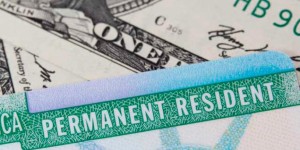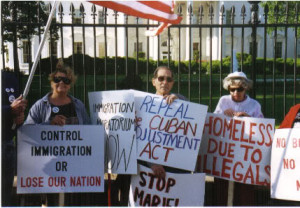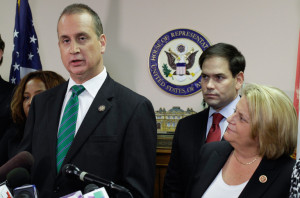THE U.S. “CUBAN ADJUSTMENT ACT OF 1966” IS ABUSED BY MOST OF THE NEW IMMIGRATION.
Sun Sentinel: “The Help” Cubans received in the US trickles to Cuba. Although it is forbidden to collect US social benefits in another country, some Cubans pay themselves with long periods on the island, and sometimes not returning.
In another installment of a series that describes as “research on special treatment to Cuban immigrants” in the United States, the newspaper Sun Sentinel of South Florida focuses today Islanders entering the country taking advantage of the Cuban Adjustment Act of 1966; They are applying for social assistance in food, medical coverage and effective; and then return to Cuba for long periods and even definitively, where they spend the money contributed by US taxpayers illegally.
The Sentinel underlines the difference between the Cubans and other legal immigrants. Cubans who take to the Cuban Adjustment Act have a unique and easy access to food stamps, disability supplementary assistance and other forms of social welfare. The remaining legal immigrants must wait five years to receive any benefits.
Stresses that such access is intended to help them rebuild their lives in the United States but is currently helping some to finance their lives in communist island, where the average wage is about $ 23 monthly.
It also specifies that regulations prohibit recipients of US social assistance receive it or use it in another country.
Although the report did not address the possibility that Cubans could travel to the United States, apply for residency (a year and a day), going on disability and return to Cuba was favored by the immigration reform of Cuba, implemented in January 2013, which expanded the legal term stay abroad for 11-24 months (extendable) and allowed Cubans living outside Cuba residence recover, even without residing on the island.
Fort Lauderdale’s diary has found that since 2003, more than 329,000 Cuban immigrants came to Florida and were found eligible for aid for refugees, including cash, medical care and job training. Now represent 9 out of 10 foreigners who receive this kind of assistance in Florida, at a cost to the publication estimated at more than $ 680 million annually.
The newspaper quoted testimonies of “sick Floridians” who are denouncing the authorities cases of relatives and neighbors who receive government assistance while going back and forth between the two sides, and leave someone in charge to extort money and send as well as spend the quota debit cards food aid.
Miguel Veloso, a barber who has been in the United States three years, told reporters Sentinel in Hialeah, first stop many newcomers Cubans hear about it all the time. According to him, recent immigrants chatter about spend a considerable time in Cuba: Beyond six months, two months here. “Come and go before the benefits expire,” says Veloso.
The newspaper also cites the immigration Grisel Ybarra, on the case of a female lawyer whose grandmother and two great-aunts came to Florida, their benefits applications were approved, they opened bank accounts and returned to Cuba. Each month, granddaughter and grandniece changing checks, worth about $ 2,400, sending half the women in Cuba and was left with the rest.
When a welfare agency asked about the whereabouts of their relatives, he sought advice from Mrs. Ybarra. He revealed to the lawyer that his grandmother had told him he did not want to return, “With the money you sent me I bought a house and am very happy in Cuba”.
The Sentinel made a clarification: Not all Cubans receive assistance from the US government. Some members of this group of immigrants, he says is one of the most successful in the country, depend on support from their families, and many who receive renounce it after a short time, once they get established.
But others, according adds the daily Fort Lauderdale, take advantage of easy money, and spend their lives in the “come and go”.
Agencies / Sun Sentinel / MartiNews / InternetPhotos / TheCubanHistory.com
The Cuban History, Hollywood.
Arnoldo Varona, Editor.
LA “LEY DE AJUSTE CUBANO DE 1966” ES ABUSADA POR GRAN PARTE DE LA NUEVA INMIGRACIÓN CUBANA.
Sun Sentinel: “la ayuda” a cubanos en EEUU se escurre a Cuba. Aunque está prohibido cobrar o utilizar beneficios sociales estadounidenses en otro país, algunos cubanos se pagan con ellos largas temporadas en la isla, y a veces ni regresan.
En otra entrega de una serie que describe como “investigaciones sobre el trato especial a los inmigrantes cubanos” en Estados Unidos, el diario Sun Sentinel del sur de la Florida se enfoca hoy en los isleños que entran al país aprovechando la Ley de Ajuste Cubano de 1966; solicitan asistencia social en alimentos, cobertura médica y efectivo; y luego regresan a Cuba por largas temporadas, e incluso definitivamente, donde gastan ilegalmente el dinero aportado por los contribuyentes estadounidenses.
El Sentinel subraya la diferencia entre los cubanos y otros inmigrantes legales. Los cubanos que se acogen a la Ley de Ajuste Cubano tienen un singular y rápido acceso a cupones de alimentos, ayuda suplementaria por discapacidad y otras formas de bienestar social. El resto de inmigrantes legales tienen que esperar cinco años para recibir cualquier beneficio.
Remarca que ese acceso está destinado a ayudarles a rehacer sus vidas en Estados Unidos pero que, actualmente, está ayudando a algunos a financiar sus vidas en la isla comunista, donde el salario medio es de unos $23 mensuales.
Precisa también que las regulaciones prohíben a beneficiarios de asistencia social estadounidense recibirla o utilizarla en otro país.
Aunque el reportaje no lo aborda, la posibilidad de que los cubanos pudieran viajar a Estados Unidos, solicitar la residencia (al año y un día), pedir beneficios sociales y regresar a Cuba fue favorecida por la reforma migratoria de Cuba, implementada en enero del 2013, que amplió el término legal de estancia en el exterior de 11 a 24 meses (prorrogables) y permitió a cubanos residentes en el exterior recuperar la residencia cubana, incluso sin estar residiendo en la isla.
El diario de Fort Lauderdale ha encontrado que, desde 2003, más de 329.000 inmigrantes cubanos llegaron a Florida y fueron hallados con derecho a ayuda para refugiados, que incluye dinero en efectivo, atención médica y capacitación laboral. Ahora representan 9 de cada 10 extranjeros que reciben esta clase de asistencia en Florida, a un costo que la publicación calcula en más de $680 millones anuales.
El periódico cita testimonios de “floridanos hartos” que están denunciando a las autoridades casos de familiares y vecinos que reciben ayuda del Gobierno mientras van y vienen entre las dos orillas, y dejan a alguien a cargo de sacarles el dinero y enviárselos, así como de gastar el cupo de las tarjetas de débito de la ayuda alimentaria.
Miguel Veloso, un barbero que lleva en Estados Unidos tres años, dijo a los reporteros del Sentinel que en Hialeah, primer lugar de parada de muchos cubanos recién llegados, se oye hablar de eso todo el tiempo. Según él, inmigrantes recientes parlotean sobre pasarse un tiempo considerable en Cuba: seis meses allá, dos meses acá. “Vas y vienes antes de que expiren los beneficios”, cuenta Veloso.
El matutino cita, asimismo, a la abogada especializada en inmigración Grisel Ybarra, sobre el caso de una mujer cuya abuela y dos tías-abuelas llegaron a la Florida, sus solicitudes de beneficios fueron aprobadas, abrieron cuentas bancarias y regresaron a Cuba. Cada mes, la nieta y sobrina-nieta cambiaba los cheques, por valor de unos $2.400, enviaba la mitad a las mujeres en Cuba y se quedaba con el resto.
Cuando una agencia de bienestar social le preguntó por el paradero de sus parientas, la señora buscó consejo de Ybarra. Le reveló a la abogada que su abuela le había dicho que no quería regresar: “Con el dinero que me mandaste me compré una casa y estoy muy contenta en Cuba”.
El Sentinel hace una aclaración: No todos los cubanos reciben ayuda del Gobierno de Estados Unidos. Algunos miembros de este grupo de inmigrantes, que dice es uno de los más exitosos del país, dependen del apoyo de sus familiares, y muchos que la reciben renuncian a ella después de un período breve, una vez que consiguen establecerse.
Pero otros, según apostilla el diario de Fort Lauderdale, se aprovechan del dinero fácil, y se pasan la vida en el “voy y vengo”.
Agencies/Sun Sentinel/MartiNews/InternetPhotos/TheCubanHistory.com
The Cuban History, Hollywood.
Arnoldo Varona, Editor.






